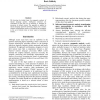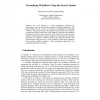1137 search results - page 93 / 228 » Knowledge Representation with Logic Programs |
147
Voted
KR
2004
Springer
15 years 8 months ago
2004
Springer
In this paper, partial knowledge about the possible transitions which can take place in a dynamical environment is represented by a set of pairs of propositional formulae, with th...
134
click to vote
FSKD
2010
Springer
15 years 3 months ago
2010
Springer
Abstract--Worldwide health scientists are producing, accessing, analyzing, integrating, and storing massive amounts of digital medical data daily, through observation, experimentat...
120
Voted
FLAIRS
2004
15 years 4 months ago
2004
We develop the default logic for pragmatic analysis of natural language queries. Ambiguous sentences are considered so that each set of meanings is assigned an extension of defaul...
102
click to vote
DEXA
2000
Springer
15 years 7 months ago
2000
Springer
The event calculus is a logic programming formalism for representing events and their effects especially in database applications. This paper presents the use of the event calculus...
115
click to vote
INFSOF
1998
15 years 2 months ago
1998
This paper presents a logic based language, SAFIN, for developing networked software agents. It integrates agent-oriented programming, KQML and basic mobile techniques to support ...


